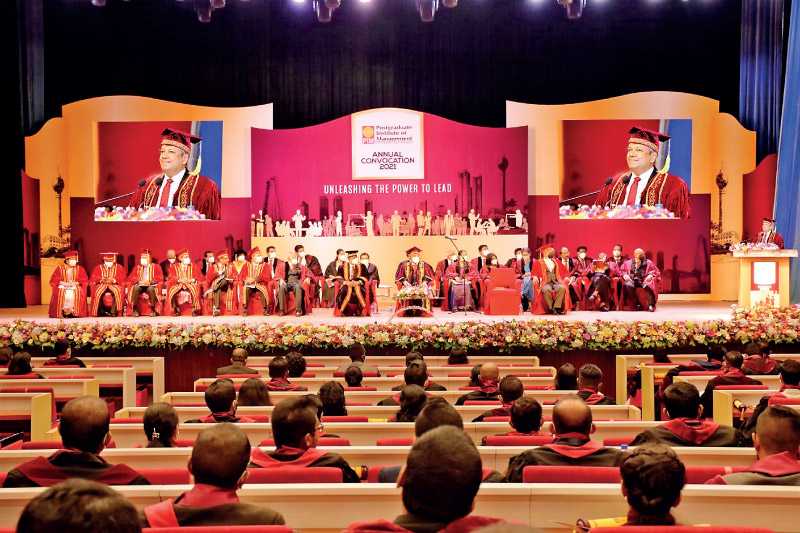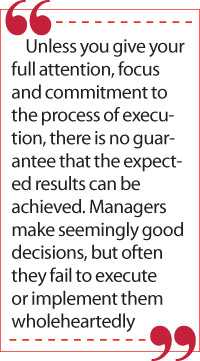Monday Feb 16, 2026
Monday Feb 16, 2026
Monday, 3 May 2021 00:15 - - {{hitsCtrl.values.hits}}

 We were indeed delighted to present 396 extraordinary managers at the PIM’s latest convocation, held recently under challenging circumstances. Due to the sudden surge of COVID-19 cases, we had to adhere to strict healthcare guidelines in limiting the participation only to the graduands excluding the visitors. It was another milestone of developing leaders with global presence and local pulse. That is why we picked the apt theme this year as ‘unleashing the power to lead’. Instead of cursing the darkness of leadership we see at many critical fronts, we decided to light not one candle but many. Today’s column is all about this prestigious event of the premier postgraduate enterprise that is aptly acclaimed as the “Nation’s Management Mentor”.
We were indeed delighted to present 396 extraordinary managers at the PIM’s latest convocation, held recently under challenging circumstances. Due to the sudden surge of COVID-19 cases, we had to adhere to strict healthcare guidelines in limiting the participation only to the graduands excluding the visitors. It was another milestone of developing leaders with global presence and local pulse. That is why we picked the apt theme this year as ‘unleashing the power to lead’. Instead of cursing the darkness of leadership we see at many critical fronts, we decided to light not one candle but many. Today’s column is all about this prestigious event of the premier postgraduate enterprise that is aptly acclaimed as the “Nation’s Management Mentor”.
Overview
As we are much aware, leadership is all about inspiring, influencing and initiating. It is more than positions and titles as it involves decisions and actions. We have been breeding leaders to the nation for over 35 years. These thoroughbred professionals have mastered value creation with confidence and competence. They are equipped with cutting-edge knowledge and complementary skills needed to perform in both private and public sectors alike. In producing them with clarity and commitment, the PIM has always been a centre of excellence in management education with its wings spreading beyond Sri Lanka.
Excellence is all about being exceptionally good. When applied to enterprises, it involves exceptional achievements in a consistent manner. That’s what the PIM is proud of as a self-financed and semi-autonomous public entity. We simply excel with extraordinary executives in essentially engaging them to unleash their true potential. The nation expects them to contribute towards the socio-economic upliftment in multiple fronts.
As our mission proclaims, we ignite human imagination by developing leaders with global presence and local pulse. In this endeavour, we pursue innovative teaching, cutting-edge research, enriching partnerships, inspiring sustainability and exemplary governance. Now the time has come to expand our reach, regionally and globally in adhering to best practices with appropriate use of technology. The PIM will continue to produce value in practicing values, as the nation’s management mentor.
Keynote speaker
Deepal Suriyaarachchi, who is a prestigious alumnus of PIM, and now serving as a member of the Board of Management of PIM, was the keynote speaker of the PIM’s annual convocation this year. We were fortunate to have him as a much-respected corporate personality with over four decades of wide industry experience, and out of that more than 15 years at board level. He proudly claims he started his career as a sales clerk. He is a Fellow member of the Chartered Institute of Marketing UK, Fellow Member of the Sri Lanka Institute of Marketing, and holds an MBA from PIM. He is also an Alumni of National University of Singapore, Asian Institute of Management, and the Stanford Business School USA.
Deepal pioneered in disseminating management knowledge in Sinhala through his book series ‘Sinhalen Business’ and many print and electronic media interventions. As a prolific writer he has authored over 15 books in Sinhala and in English, published locally and internationally on a wide range of subjects from business to philosophy. A leading Management Development Consultant, Author, Accredited Master Coach and Master Mentor, Deepal has conducted more than 1,000 various programs in over 12 countries across all five continents. He holds several leadership positions as an independent non-executive director and also engages in consultancies local and overseas.
 Highlights of the keynote address
Highlights of the keynote address
I felt Deepal’s speech was timely and topical. His main focus was to highlight how unleashing the power to lead becomes relevant in the current business context, with emphasis on ‘mastery’. He brought a wide array of points to ponder in order to ascertain the rigour and relevance associated with true mastery. I thought of sharing some extracts from his speech.
Deepal began by connecting to his MBA studies at PIM. “I am indeed grateful and honoured to stand in front of you almost after two decades, since I was where you are today.” I recall with gratitude all those who guided and supported me in my MBA journey. If not for them I would not have been here today. One of the most powerful lessons I learnt having done the MBA is that there are hardly any individual achievements. Let me illustrate that with a small incident.”
“I got married while doing the MBA. A few months after the marriage I had to take my wife to a doctor. The doctor’s appointment was clashing with a lecture at the PIM. If I skipped that class, I would have missed the required attendance resulting in repeating the subject. It was Prof. Tilak Fonseka’s class, and he meant business; excuses were difficult to come by. On the other hand, my wife’s condition meant that she sees the doctor on that very day. Finally, I asked one of my colleagues to take her to the doctor. My wife very kindly agreed to go to the doctor with him. I somehow scooted out during the tea break and made it to Nawaloka just in time to see the doctor with my wife and released my friend. This was only one instance that goes to prove that my life and what I call my success is not only mine, but so many have contributed to all of these achievements. This realisation alone is worth the entire MBA process. It makes me very humble.”
“As the PIM’s advertising slogan suggests, from today onwards you are called an MBA or an MPA,” elaborated Deepal. “In other words, a Master in Business Administration or a Master in Public Administration. Historically a man who has people working for him, especially servants or slaves was called a master.”
“On the other hand, you are supposed to have acquired a great degree of skill or proficiency in a particular function or a discipline. Though the first definition may be true in some instances what is most relevant is the second definition. To be a master of business management or public management. With mastering the craft of managing business you unleash the potential that is within you to lead teams, organisations and eventually the nation. So, I wish to explore the concept of Mastering! In business what do we really manage?”
“However complex the business or the organisation is, all what we do is managing ‘People, Processes and Policies’. All organisational activities can be classified under these three topics. After studying so much about business and so many theories and models perhaps you may not like me taking such a simple view about a business organisation. In managing these three areas all what managers do are making ‘yes’ or ‘no’ decisions and executing them.”
“A decision is selecting an option from among two or more, based either on past experiences or on assumptions about the future. However complex the decision-making process you follow, eventually a manager’s decision has got to be a ‘yes’ or a ‘no’. When making decisions we always think that it is the right decision. Whether it is right or wrong can be determined only in the future. Ideally the best decisions are those that are right by the enterprise. Managers or leaders fail to make such decisions when they are conditioned or influenced by four types of biases or extremes. These are called ‘sathara agathi’. I wish to explore these biases or agatis we should try to avoid when making decisions so that we can improve the quality of decisions.”
“The first bias or the agati is canda/chanda. This means strong attachment, liking or preference. When the decision-maker has a strong preference or an attachment towards an option then it prevents seeing any negatives. A decision taken giving priority to self-interest rather than that of the enterprise is definitely a result of this bias. When a manager identifies strongly with a particular option then also the decision can be flawed, for he/she fails or refuses to see any negatives thereof.”
“The second agati is called dvesha – or extreme dislike. This can manifest as angry reactions to dislikes in various forms. When such dislikes exist, they also prevent us from making unbiased decisions. They really blur the view.”
“The third agati is called bhaya – or fear. Fear can range from fear that comes within due to uncertainty or fear to fail as well as due to various external forces that can cause pressures on the decision maker. This is called decisions made under duress. Such decisions in most instances are not right; that is why they are not accepted as valid even legally.”
“The fourth and the final agati is called moha or ignorance. This can also be defined as a lack of required information or basing the decision on mis-information. For instance, in Japanese management, they use a concept called Gemba and Gembatsu to reduce the error due to moha – that is by observing the actual occurrence at the actual place.”
“If we can avoid these biases or agatis to a great extent we can make better decisions.”
As Deepal further went on, “The second part and to me the most important part of a decision is execution or implementing the decision.” “Unless you give your full attention, focus and commitment to the process of execution, there is no guarantee that the expected results can be achieved. Managers make seemingly good decisions, but often they fail to execute or implement them wholeheartedly.”
“After making the decision we tend to identify ourselves with the decision thinking that ‘this is my decision’.” The moment we identify ourselves with a decision we bring our own ego into the equation. Then we do not want to change the decision even if the circumstances change. But if a manager has the right attitude about making decisions, that is considering them as actions taken at a certain point in time under certain conditions with a certain set of information and assumptions, but when subsequently realise that they are not valid anymore, then such a smart manager is bold enough to change the decision.”
Way forward
As Aristotle said, roots of education are bitter but the fruits are sweet. The convocation day was a time of tasting that sweetness. A premier postgraduate program should have high quality and relevance. That’s what we at PIM are continuously striving for. I earnestly hope that the 396 private sector managers and the public sector administrators who graduated will contribute their utmost towards the betterment of themselves, their respective organisations, and the nation at large. That is how we unleash the power of leadership in breeding holistic leaders fulfilling a dire need.
(Prof. Ajantha Dharmasiri can be reached through [email protected], [email protected] or www.ajanthadharmasiri.info.)